The presidential choice before Afghans
- Published
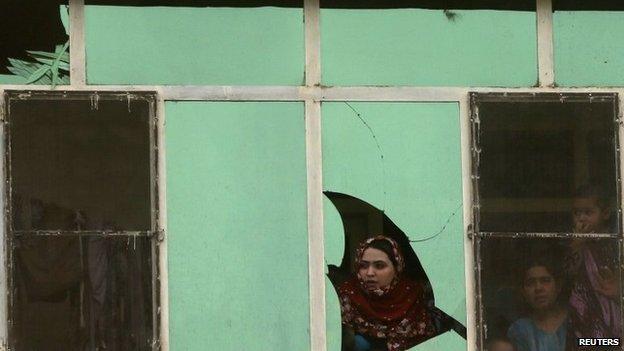
Security will be the major challenge for the next Afghan president
As Afghans prepare to vote in the presidential run-off later this week, the BBC's David Loyn in Kabul considers the choice before them.
The leading candidate in the Afghan presidential election, Abdullah Abdullah, says he will debate with his opponent, Ashraf Ghani, if the conditions are right.
Until now Mr Abdullah has been unwilling to have a face-to-face debate, although the two were in debates with other candidates in the first round in April.
The second round between the two remaining candidates is on 14 June, and Mr Abdullah says he would do one debate this week if several TV stations made a joint approach.
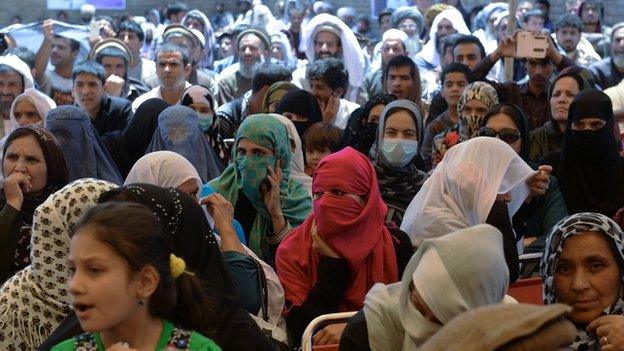
The candidates have been holding campaign rallies across the country
The only point of difference may be in the length of the debate. Mr Ghani favours something short, while Mr Abdullah wants the debate to be "three to four hours."
Mr Ghani told the BBC that his rival's failure to agree to a debate so far "speaks volumes by his silence." He said that a refusal to answer questions from the public now, suggested that Mr Abdullah would not be accountable when in office.
Mr Ghani won 31.5% of the vote in the first round, against 45% for Mr Abdullah, and has more to gain than the front-runner with the public exposure of a debate. He said that Mr Abdullah is unwilling to face questions about corruption associated with people who have joined his campaign.
But Mr Abdullah told the BBC, with some irony, that he "praised the courage" of Mr Ghani for raising that line of argument, when "he has people on his side whose portraits he cannot take to the provinces of Afghanistan".
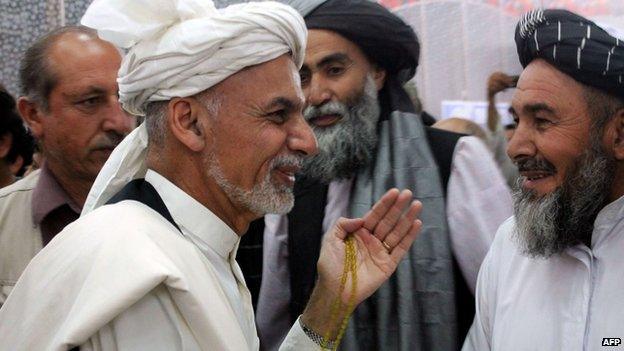
Ashraf Ghani wants to reform the presidency
He was referring to General Abdul Rashid Dostam, a controversial figure from the civil war in the 1990s. Although powerful in the north and north-west, Dostam has many enemies elsewhere in the country.
Mr Ghani secured a public apology from Gen Dostam at the beginning of the campaign, and justifies giving him a place as vice-presidential candidate as part of the politics of inclusion. He said that Gen Dostam had changed: "As someone who knows war, he is tired of it." He said: "Afghanistan is not a green field, where you can build anything you desire from bookish designs".
There are real differences in substance between the candidates, although on paper the offers look the same, with both promising to tackle corruption, improve governance, and improve Afghanistan's relations with the outside world, particularly the US.
Mr Ghani has spent far more time abroad, and is an internationally acknowledged expert in advising developing economies. He wants to reform the presidency to make it a less "person-centred" organisation. He has promised a quasi-prime ministerial role for Zia Massud, the brother of one of the leading guerrilla fighters from the 1980s.
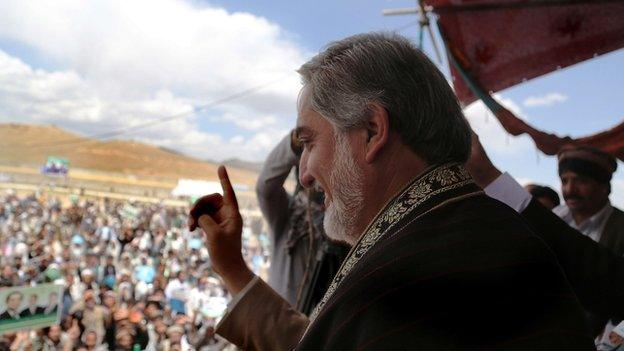
Abdullah Abdullah says he is the candidate who offers a coherent programme
He said that Mr Abdullah did not have coherent plans to cope with an economy that "is imploding", and on track for zero growth this year.
But Mr Abdullah said that his programme was coherent, and far more practical than the "hollow promises" of his opponent. It is, he told the BBC, a "genuine programme for the betterment of the people of Afghanistan."
Both men are critical of President Karzai for allowing relations with the US to deteriorate. President Obama's recent decision to commit troops only for a further two years and not the expected 10 years has presented significant challenges for the incoming government.
There is no doubt that either candidate would sign, within days of taking office, the security agreement with the US that President Karzai failed to sign. But both are anxious about making sure that Afghan forces are good enough in time for the final US departure.
Afghan air power and medical evacuation are two areas that are a long way from the capability they need. And both know that once US troops depart, it will be harder to persuade international donors, particularly the US, to keep paying for Afghan security. There is a major conference on funding for Afghanistan in London in November.
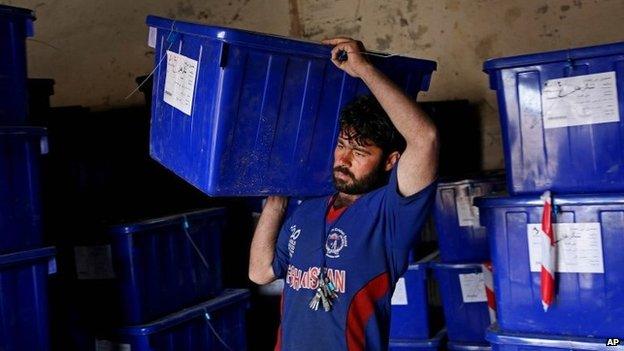
There was euphoria when seven million people voted in the first round
Mr Ghani fears that without the presence of US forces, he would need to spend too much time lobbying a sceptical Congress to continue funding Afghanistan, needing to tell them that continued aid "is in their national interest and in the global interest."
There was an air of euphoria when seven million people came out to vote in the first round, and nobody expects the turnout to be as high on 14 June.
The attack on Mr Abdullah's convoy on 6 June is a reminder of the security challenges that are being faced. The first round was at the end of the winter, the second in high summer, with lush vegetation offering cover for attackers.
Old divisions may dictate the outcome - North/South; Tajik/Pashtun; Mujahideen/Communist. Mr Abdullah, although half Pashtun, is usually associated with the Tajik north, and former Mujahideen guerrilla leaders have coalesced around his banner.
Mr Ghani, from a significant Pashtun family, is expected to do better in the south, and is backed by many former communists.
But a new Afghanistan is beginning to emerge that ignores the divisions of the past, as it comes close to completing this first peaceful transition of democratic power.